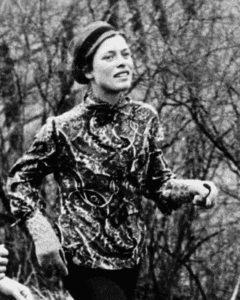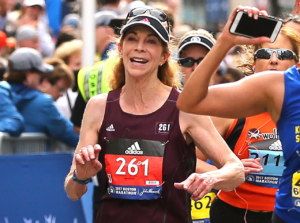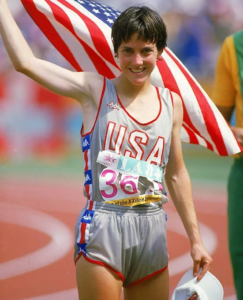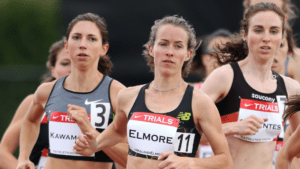International Women’s Day 2022
Throughout history, there have been many outstanding female pioneers in their respective fields, who have dispelled myths and broken through the metaphorical glass ceiling. This year for International Women’s Day, Landmark Sport Group and the Mississauga Marathon have chosen to highlight some of the amazing women who helped transform opinions of women in sport and set the course for future female runners.
Roberta ‘Bobbi’ Gibb
Bobbi grew up with a passion for running. By the time she was in college, she was already running her 8-mile commute from home to school. Bobbi trained for two years to run the 1966 Boston Marathon, only to receive a letter from their race director that she didn’t qualify because women aren’t “physiologically able to run a marathon.” The letter only fuelled her motivation, and she showed up to the Boston Marathon disguised in a hoodie and shorts. She hid in a bush near the start line, and when the gun went off, she joined the men and finished the race in 3 hours, 21 minutes, and 40 seconds, ahead of two-thirds of the runners. Though the race director continually denied her participation, Bobbi ran in the Boston Marathon again in 1967 and 1968, ranking as the unofficial women’s winner for both. Bobbi ran the 1996 Boston Marathon, the 30th anniversary of her first time running the event, and finally received acknowledgement of her first three wins and a winner’s medal.
Kathrine Switzer
Kathrine started running with the men’s cross country team at Syracuse University, where she got the inspiration to train for the 1967 Boston Marathon. Kathrine entered under the name K.V. Switzer and received bib number 261. She kept a low profile and had no problems until about the fourth mile when the media realized a woman was running in the race. The media frenzy attracted the race directors’ attention, who then went after Kathrine in an attempt to take her bib and prevent her from competing. She finished the race in 4 hours and 20 minutes despite all that. Over the years, Kathrine won many awards and was even named Female Runner of the Decade from 1967 to 1977. She started the Avon International Running Circuit, a worldwide series of races for women that paved the way to the women’s marathon becoming an Olympic event. Since then, Kathrine has covered marathon running for all the major TV networks and started a non-profit called 261 Fearless that uses running to empower women and promote healthy lifestyles. In 2017, Kathrine ran the Boston Marathon for the 50th anniversary of her first time with the same bib number. The Boston Athletic Association announced that bib number 261 would not be given to any other runners in honour of Kathrine Switzer.
Joan Benoit Samuelson
Joan only started long-distance running to help her recover from a broken leg, and injury suffered while competing in alpine skiing. Her running ability earned her a scholarship to North Carolina State University, where she was on the All-American team for two years. She then signed up to run in the Boston Marathon in 1979, where she won first place in 2:35:15. Joan’s time shattered the previous women’s record by almost 8 minutes. She went on to win the US 10,000 meter championship and set another record at the 1983 Boston Marathon, with a course and world record of 2:22:43. Despite undergoing Achilles tendon and knee surgery, she competed in the Los Angeles 1984 Olympics and won the first Olympic Women’s Marathon with a time of 2:24:52. Joan received the 1985 James E. Sullivan Award as the top amateur athlete in the US. She was also inducted into the National Distance Running Hall of Fame, the Maine Women’s Hall of Fame, and the USATF Masters Hall of Fame. To this day, Joan
Malindi Elmore
Malindi’s passion for running was sparked by watching Joan Benoit competing in the 1984 Olympics. By the age of 12, she was already running races and had her heart set on competing in the Olympics. Malindi’s dream came true at the Athens 2004 Olympics, where she competed in the 1500m. Her personal best time from that competition of 4:02.64 still makes her the 6th fastest woman in the 1500m in Canadian history. Malindi briefly retired from running, after not making the cut for the 2008 and 2012 Olympics. However she changed pace after the birth of her first child, and started running triathlons. In two years, Malindi competed in 20 triathlons with numerous podium finishes, including finishing in third in Arizona, with a time of 8:57. After the birth of her second child, she started competing in marathons, which brought back her desire to compete in the Olympics. She returned to the Tokyo 2021 Olympics and finished in 9th place in the marathon. Also, she is a four-time Canadian champion in the 1500m and a bronze medalist in the Pan American Games and the World University Games.
References
- Biography – Bobbi Gibb – First Woman Runner in the Boston Marathon. (n.d.). Bobbi Gibb Art. https://www.bobbigibbart.net/bio
- Bobbi Gibb. (2019). Encyclopedia.com. https://www.encyclopedia.com/sports/encyclopedias-almanacs-transcripts-and-maps/gibb-bobbi
- Elmore, M. (2022). About Malindi: Personal History and Career Highlights. https://malindielmore.com/about-malindi/
- Joan Benoit. (2022). United States Olympic & Paralympic Committee. https://www.teamusa.org/Hall-of-Fame/Hall-of-Fame-Members/Joan-Benoit#halloffame
- Kathrine Switzer. (2022). New York Road Runners. https://www.nyrr.org/about/hall-of-fame/kathrine-switzer
- Malindi Elmore. (2022). Canadian Olympic Committee. https://olympic.ca/team-canada/malindi-elmore-2/
- Moore, K. (1983, May 2). The Marathon’s Maine Woman. Sports Illustrated. https://vault.si.com/vault/1983/05/02/the-marathons-maine-woman
- Switzer, K. (2007, March 30). Marathon Woman: Running the Race to Revolutionize Women’s Sports. https://kathrineswitzer.com/1967-boston-marathon-the-real-story/





